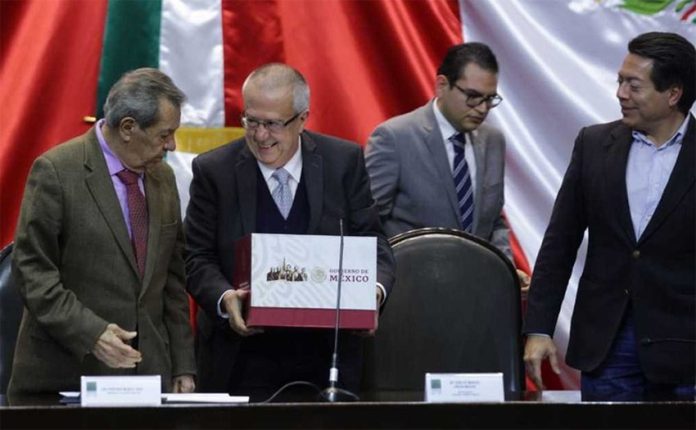The new federal government presented its first budget Saturday, pledging “absolute commitment to fiscal and financial discipline” and a surplus of 1% of GDP in 2019 without introducing any new taxes.
Presentation of the 2019 Economic Package came just two weeks after leftist political veteran Andrés Manuel López Obrador was sworn in as president.
His party, the National Regeneration Movement, or Morena, leads a coalition that has a majority in both houses of federal Congress.
Finance Secretary Carlos Urzúa outlined details of the 5.8 trillion-peso (US $288 billion) budget to the lower house, including spending of 252 billion pesos (US $12.5 billion) on “priority projects.”
One hundred billion pesos will be allocated to doubling old-age pensions, 44 billion pesos will go to a youth apprenticeship program, 18 billion to upgrading airport infrastructure, 15 billion to a reforestation program and 6 billion to construction of the Maya Train project on the Yucatán peninsula.
The budget earmarked 15 billion pesos to convert the Santa Lucía Air Force Base in México state for commercial aviation use.
López Obrador confirmed in late October that the partially-built US $13-billion airport project at Texcoco would be scrapped, triggering concern about the economic impact of the move.
Urzúa said the budget didn’t include funds to repay investors who purchased US $6 billion in bonds to help fund the cancelled project. Bondholders have so far rejected a buyback offer even though the government sweetened the deal last week.
The overall expenditure projected for 2019 is 6.1% higher in real terms than that outlined in the 2018 budget but was expected to be 0.2% lower than actual spending this year.
“Prudence, responsibility and objectivity are the premises under which the budget was constructed,” the Secretariat of Finance (SHCP) said in a statement.
The Secretariat of Labor and Social Welfare, which will implement the apprenticeship scheme, gets a whopping 932% increase to its 2018 budget, while spending on energy will go up by an even higher 961%.
State oil company Pemex will be among the beneficiaries of the latter increase.
The army will get just under 93.7 billion pesos, an 11.3% increase on this year, while public education spending will increase 2.9% to just over 300 billion pesos.
Almost 2 billion pesos will be allocated to state governments and 8 billion will go to communities affected by last year’s earthquakes.
The secretariats of the Interior, Foreign Relations, Finance, Agriculture, Communications and Transportation, Economy, Health, the Navy, Culture and the Environment were among 15 secretariats that saw their funding reduced as the government seeks to cut government costs in line with its austerity program.
The budget predicted GDP growth of 2% next year, which is slightly above market forecasts of 1.8% to 1.9%. Urzúa said the government expected growth to actually be above 2% in 2019 but that he wanted to be “conservative.”
The budget forecast revenue of almost 5.3 trillion pesos next year, of which taxes and oil income are estimated to contribute 62.3% and 19.8% respectively.
Implementation of a free zone in the northern border area, which will see both value-added tax and income tax levels reduced, will cost the government around 40 billion pesos next year, Urzúa said, a figure that is less than half of some market estimates.
The government forecasts inflation of 3.4% in 2019, which is around 0.5% below the market outlook, and expects the exchange rate to remain near its current level of 20 pesos to the US dollar.
The budget forecasts that Mexican crude prices will drop to an average of US $55 per barrel next year, down from US $62.70 currently, and that oil production will be just over 1.8 million barrels a day, which is close to current levels.
López Obrador has pledged to increase oil production during his administration in order to reduce dependency on imports. The tendering process to build a US $8-billion refinery at Dos Bocas, Tabasco, is expected to start early next year.
Urzúa told reporters after his budget presentation that Mexico would continue with an oil hedging program in 2019 in order to protect government revenues but declined to give details apart from saying “it’s very reasonable, very well done and gives us lots of security.”
He said the conflict with the Supreme Court over the government’s plan to slash the wages of high-ranking public officials including judges was “irrelevant” in the calculation of the budget.
The finance secretary contended that the budget was reflective of the new government’s stringent austerity plan.
In his inauguration speech on December 1, López Obrador pledged to put an end to corruption and impunity and to begin a “profound and radical transformation” of Mexico.
The new president has adopted a range of personal austerity measures, including traveling on commercial flights and largely eschewing security.
Source: Financial Times (en), Milenio (sp), El Economista (sp)
